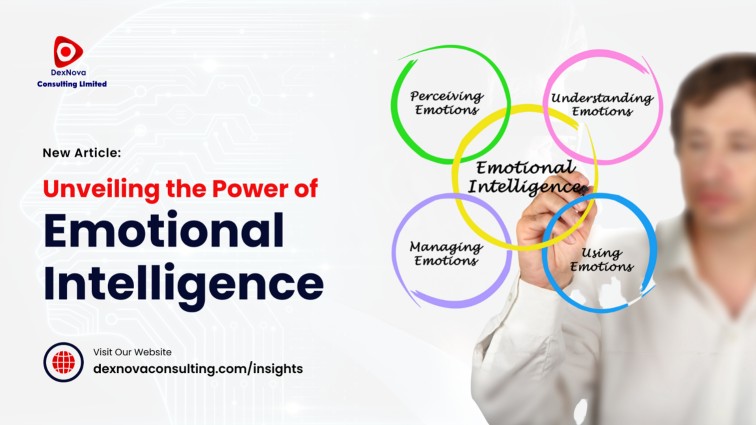Unveiling the Power of Emotional Intelligence
- October 24, 2023
- Posted by: dexnovaconsulting
- Category: Articles

Unveiling the Power of Emotional Intelligence
Introduction
Caption: “Unlock the Potential Within You! Learn Emotional Intelligence and Transform Your Life.”
In a world that increasingly values knowledge and abilities, the ability to comprehend and manage emotional intelligence (EI) has become a critical trait for personal and professional success. While traditional Intelligence (IQ) is essential, emotional Intelligence often affects how we navigate life’s challenges, build relationships, and achieve our goals.
Defining Emotional Intelligence
Emotional Intelligence (EI) is the ability to identify, understand, analyze, control, and effectively employ one’s own emotions while also being sensitive to the emotions of others. It is a skill that allows us to connect with others, manage stress, make informed decisions, and deal with the ups and downs of life.
“Emotional intelligence is the secret sauce to effective project management. It’s the ability to understand and connect with the people driving the project, manage stress and conflicts, and inspire teams toward success. In the realm of project management, technical skills are just the beginning. Emotional intelligence is what truly sets exceptional leaders apart.” – Otolorin Tobiloba
The Components of Emotional Intelligence
Emotional Intelligence comprises several components, which can be categorized into four main areas:
- Self-awareness involves recognizing your emotions and understanding how they can influence your thoughts and actions. It’s about being in tune with your inner emotional landscape.
- Self-regulation: Once you’re aware of your emotions, the next step is to regulate them. Self-regulation means controlling impulsive reactions, managing stress, and adapting to changing circumstances calmly and composedly.
- Social awareness: This involves being empathetic to the emotions of others. It’s about understanding people’s feelings, needs, and concerns and showing genuine interest in their well-being.
- Relationship Management: The ability to build strong relationships, communicate effectively, resolve conflicts, and work collaboratively. This skill helps nurture healthy and productive relationships in both personal and professional life.
Learn Emotional Intelligence Here
Why Emotional Intelligence Matters
- Effective Communication: High EI individuals are often exceptional communicators. They can convey their thoughts and feelings, listen attentively, and understand non-verbal cues. This is invaluable in personal relationships and the workplace.
- Conflict Resolution: With EI, individuals can navigate conflicts constructively. They can approach disagreements with empathy, find common ground, and resolve issues amicably.
- Leadership: Leaders with high EI tend to be more successful. They can inspire and motivate their teams, build trust, and adapt to various situations effectively.
- Stress Management: EI helps cope with stress and pressure. Emotionally intelligent individuals can remain composed under stressful situations and make rational decisions.
- Personal Well-being: People with a high level of EI tend to have better mental health. They are more resilient and better equipped to handle life’s challenges.
Developing Emotional Intelligence
The encouraging thing is that emotional Intelligence can be cultivated and enhanced over time. Here are some ideas for improving your EI:
- Self-reflection: Regularly reflect on your emotions and reactions. Attempt to comprehend the core causes of your emotional responses.
- Active listening: Practice active listening when interacting with others. Pay attention not only to their words but also their tone, body language, and emotions.
- Empathy: Make a conscious effort to understand and share the feelings of others. Put yourself in their shoes to comprehend their perspective.
- Stress management: Adopt healthy stress-reduction techniques such as meditation, deep breathing, and exercise to improve self-regulation.
- Feedback: Seek feedback from others about your emotional reactions and interpersonal skills. Use this information for self-improvement.
Learn Emotional Intelligence Here
“Certainly, technical skills and expertise are vital, but the ability to understand and manage one’s emotions and those of others truly distinguishes a remarkable leader. Emotional Intelligence is the compass that guides us through the complexities of human interactions and helps us chart a course toward success.” – Otolorin Tobiloba
Conclusion
Emotional Intelligence is much more than a “soft skill.” It’s a critical element of personal and professional success. By nurturing your emotional Intelligence, you can become a more effective communicator, a better leader, and a happier, more resilient individual. So, whether you’re looking to excel in your career, build stronger relationships, or enhance your overall well-being, investing in your emotional Intelligence is a wise choice.

Vbn